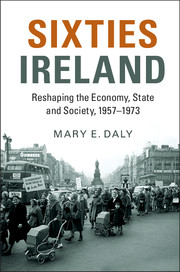Conclusion: abandoning the past?
Published online by Cambridge University Press: 05 March 2016
Summary
The conception of the Irish as a people mainly preoccupied with historic grievances and indifferent to the opportunities for development was probably never true, but certainly it has no relation to the situation of today. The Irish are aware of their history … the consequences of struggles and sacrifices … fully alive to the need for maintaining maximum efficiency … industrial growth.
Ireland has passed through her period of revolution and the turbulent aftermath, and her long hard climb to economic prosperity is nearing success. She has reached a watershed in her development wherein the emphasis is no longer on political or constitutional transformation but on economic and social change. Her wounds have healed, or nearly so. She is now able to see herself for what she is: a small nation with much to be proud of, particularly in the field of international affairs; a nation not afraid to face up to its problems.
One of the recurrent themes in the 1960s was that Ireland had abandoned its preoccupation with the past to focus on the present, redirecting its energies towards economic and social development instead of the previous fixation on national sovereignty. National pride and national commitment were increasingly linked with economic success and Ireland's greater involvement in world affairs. Economic development was welcome because it would bring an end to emigration, while offering a mechanism for building a new relationship with both Britain and Northern Ireland. But the outbreak of violence in Northern Ireland in 1969 forced both the government and the wider society to reconsider the origins of the state, and its political and ideological identity – issues that could not be resolved by economic development. Yet even before 1969, when an economic agenda was paramount, the drive for economic growth was moderated by a wish to preserve existing social structures.
The year 1966 marked the Golden Jubilee of the Easter Rising, the event most commonly seen as sparking the revolution that resulted in an independent Ireland. The celebrations were subsequently condemned for reigniting physical force republicanism and armed conflict in Northern Ireland, though I question that simplistic analysis. One striking feature of the official commemoration was the rather self-congratulatory celebration of the success of the Irish state, and the emphasis that was placed on future challenges and aspirations.
- Type
- Chapter
- Information
- Sixties IrelandReshaping the Economy, State and Society, 1957–1973, pp. 362 - 386Publisher: Cambridge University PressPrint publication year: 2016

